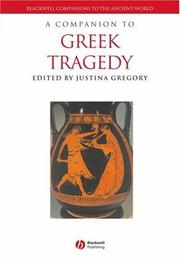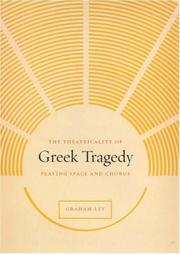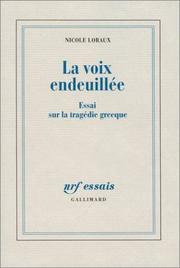| Listing 1 - 10 of 36 | << page >> |
Sort by
|

ISBN: 1405107707 9781405107709 1405175494 0470996676 9786610285914 140516588X 0470795832 1782685901 1280285915 1405152052 Year: 2006 Publisher: Malden (Mass.) : Blackwell,
Abstract | Keywords | Export | Availability | Bookmark
 Loading...
Loading...Choose an application
- Reference Manager
- EndNote
- RefWorks (Direct export to RefWorks)
A Companion to Greek Tragedy provides readers with a fundamental grounding in Greek tragedy and also introduces them to the various methodologies and the lively critical dialogue that characterize the study of Greek tragedy today." "The volume comprises 31 essays written by an international cohort of scholars. The essays are organized into four sections. The opening section on Contexts surveys Greek tragedy's historical, religious, political, and artistic background. A section on Elements follows, examining the genre's structural components. A section on Approaches presents a series of essays exemplifying particular lines of enquiry; and the final section on Reception traces the interpretative tradition from ancient to modern times." "Throughout the volume, all ancient Greek is transliterated and translated, and technical terms are explained as they appear, making the Companion accessible to those without detailed knowledge of the language or the genre.
Book
ISBN: 9780199232512 0199232512 9786612383311 1282383310 0191572616 Year: 2010 Publisher: Oxford Oxford University Press
Abstract | Keywords | Export | Availability | Bookmark
 Loading...
Loading...Choose an application
- Reference Manager
- EndNote
- RefWorks (Direct export to RefWorks)
This is an invaluable introduction to ancient Greek tragedy which discusses every surviving play in detail and provides all the background information necessary for understanding the context and content of the plays. Edith Hall argues that the essential feature of the genre is that it always depicts terrible human suffering and death, but in a way that invites philosophical enquiry into their causes and effects, This enquiry was played out in the bright sunlight of open-air theatre,which became a key marker of the boundary between living and dead. The first half of the book is divided into fou
Book
ISBN: 2706817089 9782706817083 Year: 2003 Publisher: Paris Maisonneuve & Larose
Abstract | Keywords | Export | Availability | Bookmark
 Loading...
Loading...Choose an application
- Reference Manager
- EndNote
- RefWorks (Direct export to RefWorks)
Book
ISBN: 2251440410 9782251440415 Year: 1995 Publisher: Paris Les Belles Lettres
Abstract | Keywords | Export | Availability | Bookmark
 Loading...
Loading...Choose an application
- Reference Manager
- EndNote
- RefWorks (Direct export to RefWorks)
Book
ISBN: 9783823364849 3823364847 Year: 2009 Volume: 7 Publisher: Tübingen Gunter Narr Verlag
Abstract | Keywords | Export | Availability | Bookmark
 Loading...
Loading...Choose an application
- Reference Manager
- EndNote
- RefWorks (Direct export to RefWorks)

ISBN: 9780226477572 0226477576 0226477584 9786612646393 0226477568 1282646397 9780226477565 9781282646391 661264639X Year: 2007 Publisher: Chicago University of Chicago Press
Abstract | Keywords | Export | Availability | Bookmark
 Loading...
Loading...Choose an application
- Reference Manager
- EndNote
- RefWorks (Direct export to RefWorks)
Ancient Greek tragedy has been an inspiration to Western culture, but the way it was first performed has long remained in question. In 'The Theatricality of Greek Tragedy', Graham Ley provides an illuminating discussion of key issues relating to the use of the playing space and the nature of the chorus, offering a distinctive impression of the performance of Greek tragedy in the fifth century BCE. Drawing on evidence from the surviving texts of tragedies by Aeschylus, Sophocles, and Euripides, Ley explains how scenes with actors were played in the open ground of the orchestra, often considered as exclusively the dancing place of the chorus. In reviewing what is known of the music and dance of Greek antiquity, Ley goes on to show that in the original productions the experience of the chorus& expressed in song and dance and in interaction with the characters& remained a vital characteristic in the performance of tragedy. Combining detailed analysis with broader reflections about the nature of ancient Greek tragedy as an art form, this volume& supplemented with a series of illustrative drawings and diagrams& will be a necessary addition to the bookshelf of anyone interested in literature, theater, or classical studies.
Drama --- Greek drama (Tragedy) --- Theater --- Technique. --- History and criticism. --- History --- Drama - Technique. --- Drama -- Technique. --- Greek drama (Tragedy) - History and criticism. --- Greek drama (Tragedy) -- History and criticism. --- heater -- Greece -- History -- To 500. --- Theater - Greece - History - To 500. --- Languages & Literatures --- Greek & Latin Languages & Literatures --- History and criticism --- Technique
Book
ISSN: 08914087 ISBN: 9781433104541 1433104547 Year: 2009 Volume: 16 Publisher: New York, N.Y. Lang
Abstract | Keywords | Export | Availability | Bookmark
 Loading...
Loading...Choose an application
- Reference Manager
- EndNote
- RefWorks (Direct export to RefWorks)
Thematology --- Classical Greek literature --- Drama --- Greek drama (Tragedy) --- Justice in literature --- History and criticism --- Athena --- In literature --- Athens (Greece) --- Greek drama (Tragedy) - History and criticism --- Athena - (Greek deity) - In literature --- Athens (Greece) - In literature --- Athena - (Greek deity)
Book
ISBN: 9780199577842 0199577846 0191722626 9786612698323 0191573647 128269832X Year: 2010 Volume: *51 Publisher: Oxford Oxford University Press
Abstract | Keywords | Export | Availability | Bookmark
 Loading...
Loading...Choose an application
- Reference Manager
- EndNote
- RefWorks (Direct export to RefWorks)
Poetry --- Classical Greek literature --- Drama --- Greek drama (Tragedy) --- Chorus (Greek drama) --- History and criticism --- History and criticism. --- Chorus (Greek drama). --- Drama - Chorus (Greek drama) --- Greek drama (Tragedy) - History and criticism
Book
ISBN: 9782707322012 2707322016 Year: 2012 Volume: *15 Publisher: Paris Minuit
Abstract | Keywords | Export | Availability | Bookmark
 Loading...
Loading...Choose an application
- Reference Manager
- EndNote
- RefWorks (Direct export to RefWorks)
Il faut sauver la tragédie grecque de toute la gnose philosophique et tragique qui l'accable depuis près de trois siècles. Il faut la sauver de notre conception moderne de la littérature et du théâtre. Il faut la sauver de nous-mêmes pour la retrouver ailleurs, très loin, dans les lieux les plus improbables : le nô japonais, la messe catholique, la psychanalyse freudienne... A moins qu'elle ne soit déjà plus nulle part. Car la tragédie est aussi introuvable que le tombeau d'Œdipe, ce tombeau que Sophocle prit pour thème de sa pièce ultime, laquelle est également la dernière tragédie grecque connue. Avec Oedipe à Colone pour fil conducteur, ce livre raconte l'histoire édifiante d'une incompréhension à laquelle nous sommes voués. Il révèle les incroyables trahisons et mutilations dont ces chefs-d'œuvre furent les victimes et propose en retour quelques thèses - ou hérésies - susceptibles de bouleverser non seulement notre vision de la tragédie, mais notre conception même de la littérature et de ses pouvoirs - sur les lieux, les corps et les dieux. Nul détour n'est aujourd'hui si troublant ni si salutaire.
Philosophy --- Medieval Greek literature --- Greek drama (Tragedy) --- Tragédie grecque --- History and criticism. --- Histoire et critique --- Sophocles. --- History and criticism --- Classical Greek tragedy --- Criticism --- Criticism. --- Tragédie grecque --- Greek drama (Tragedy) - History and criticism

ISBN: 2070731707 9782070731701 Year: 1999 Publisher: [Paris] : Gallimard,
Abstract | Keywords | Export | Availability | Bookmark
 Loading...
Loading...Choose an application
- Reference Manager
- EndNote
- RefWorks (Direct export to RefWorks)
Greek drama (Tragedy) --- Grief in literature --- History and criticism --- Greece --- Civilization --- Grief in literature. --- History and criticism. --- To 146 B.C. --- Greek drama (Tragedy) - History and criticism. --- Théâtre (genre littéraire) grec. --- Tragédie grecque.
| Listing 1 - 10 of 36 | << page >> |
Sort by
|

 Search
Search Feedback
Feedback About UniCat
About UniCat  Help
Help News
News